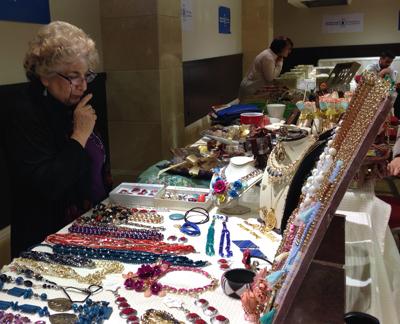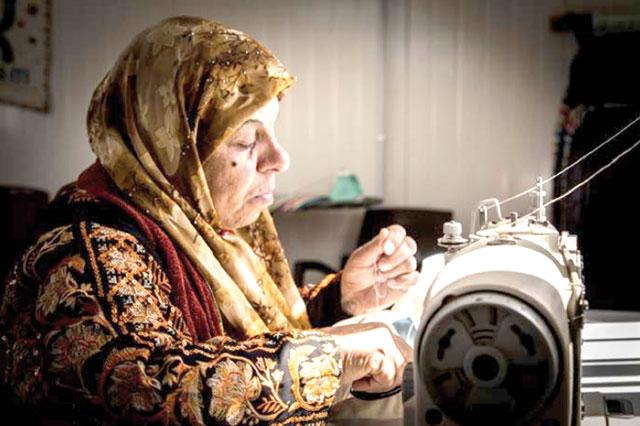You are here
Syrians in Mafraq utilise their skills to train Jordanian peers, enabling them to seek employment
By Lara Darwazah - Oct 16,2016 - Last updated at Oct 16,2016

Syrian Hamda Al Sirri (left) and Jordanian Marah Nueimat are among the beneficiaries of the UN’s Skills Transfer Programme (Photos by Lara Darwazah)
AMMAN — Home of the largest Syrian refugee camp since the civil war broke out in 2011, Mafraq, 80km northeast of Amman, has become an oasis away from home for Syrians fleeing tragedy just across the border.
The Syrian population in the city extends beyond the walls of the Zaatari Refugee Camp and into the general Jordanian community.
As Syrian refugees begin to rebuild their lives in Mafraq, they have come to make up an entire half of its population, nearly doubling it since 2012.
As new neighbours settle into the community, tension can be inevitable, and a proper introduction of the two groups becomes necessary.
The UN views this unique evolution of Mafraq not as a threat to the community, but rather as a vital opportunity for Syrians and Jordanians to support one another, believing that each group has something to gain from the other.
From this perspective, the UN Development Programme (UNDP) and the UN World Food Programme (WFP), in partnership with Jordan’s Business Development Centre, have introduced a new project to the Kingdom, providing the opportunity for Jordanians and Syrians to work together.
The Skills Transfer Programme gives Syrian refugees the ability to practise their skills without facing the challenge of obtaining a work permit, while also providing training and employment to vulnerable Jordanians.
The 100 Syrian participants of the pilot programme will train 200 Jordanians in career-set skills ranging from food production to sewing.
Participants will each earn JD10 a day during the three-month training period.
Following training, Jordanian participants will put their new skills into practice through employment. A select few of the Jordanian participants will have the unique opportunity to start their own private businesses.
With few opportunities to work in the Kingdom, it becomes necessary for Syrians to find another way to practise their skills, as those skills will be vital to rebuilding Syria when they return home one day.
But for many of these Syrians in Mafraq, it has been a long time since they have been able to formally practise their skills. This is why the programme begins with a refreshment-training phase for Syrian participants.
Ibrahim Al Badareen, from the Garment Service Centre, is one of the trainers for the skill refreshment phase. As someone who has been working in this line of business all his life, Badareen gives students a general view of what is going on in the world of fashion and industry and how to be sustainable when starting one’s own business.
But Syrians face a challenge when pursuing entrepreneurship in Jordan. Badareen explains that “starting a business is not possible for [Syrian refugees] according to the laws of ownership as a non-Jordanian”.
True to their reputation to be hard-workers, Syrians have worked around these restrictions.
Badareen points out that the culture amongst the Syrians in Zaatari is to custom make their own clothing rather than to buy items ready-made, creating a great opportunity to work from home.
One of the Syrian participants whom Badareen trained in the refreshment course, Hamda Al Sirri, agrees with this point.
“There is huge demand for custom made clothes. I can do it from the comfort of my own home [and] it is innovative, as I have to create something different from what is available in the shops,” Al Sirri explains.
The 23-year-old had left her home in Homs, Syria in 2011 after losing her husband in the war.
She had married right after obtaining her high school diploma. Al Sirri now lives in the village of Zaatari with her family, who have supported her during her loss.
The young Syrian holds great passion for fashion design. It was her mother’s sewing machine that led her to begin creating clothing — ultimately leading her to study fashion at school back in Syria, where she would annually exhibit her work.
She says she is grateful that she is getting a refresher’s course and feels it is reinforcing her knowledge.
Al Sirri is especially excited to transfer her skills and ideas across to someone who can implement them. She adds that she already feels an affinity for her Jordanian trainees and expects the programme to create a strong connection between the Syrians and Jordanians.
High school graduate Marah Nueimat will be one of Al Sirri’s students for the training phase.
The 21-year-old received her inspiration for fashion design from her Syrian aunt. This joint cultural background makes it easy for her to connect with Syrians, she says.
“I love sewing; my dream is to design skirts in particular, and to make them into my favourite colour: Maroon.”
Nueimat has high hopes and expectations for her future.
Her mother, Aida, emphasises how hard working and ambitious her daughter is.
As soon as she heard about this programme, Aida knew it was an opportunity her daughter would take advantage of.
“My mom is my greatest supporter, in fact she has been the driving force in my life. She has taught me that failure is part of learning. Her encouragement [plays] a major role in my determination,” Nueimat says.
“It is important [that] I plan my life and learn new skills. I will not just stay at home. I am very optimistic about this course because I will learn valuable things that can help me continue with my university [education] afterwards. But first I must get the basics right,” she adds.
After the course, Nueimat plans to apply to Zarqa University to gain more work experience before ultimately opening her own clothing business.
She welcomes the opportunity to be trained by a Syrian seamstress, saying Syrians are very skilled and creative people.
Apart from the vocational and financial benefits this project entails for people like Nueimat and Al Sirri, the true value of the UNDP-WFP skills transfer programme lies in it being an exercise in enhancing the rapport between Syrians and Jordanians in the Zaatari village and the city of Mafraq.
The skills programme works to bring the two groups together to meet each other’s needs.
The programme is a reflection of WFP’s future in humanitarian assistance, as it evolves from direct aid to resiliency and development assistance.
It is also a reflection of the hopeful future for people like Nueimat and Al Sirri, giving them opportunities to grow and work together as neighbours.
The writer is an education specialist who also blogs about culture and food (www.alifeonaplate.com). She has partnered with WFP to write a series of articles that explores the lives of vulnerable Jordanians and Syrian refugees through their food. The articles will be published in The Jordan Times biweekly.
Related Articles
AMMAN — The World Food Programme (WFP) on Saturday honoured 10 Jordanian and Syrian women in Amman after they successfully managed to start
AMMAN — Abeer, a 36-year-old Jordanian woman and mother of four, was forced to take control of her family’s finances after the death of her
AMMAN — With some 5,000 cash-for-work positions available for nearly 80,000 Syrian refugees living in Zataari camp, the competition for work

















